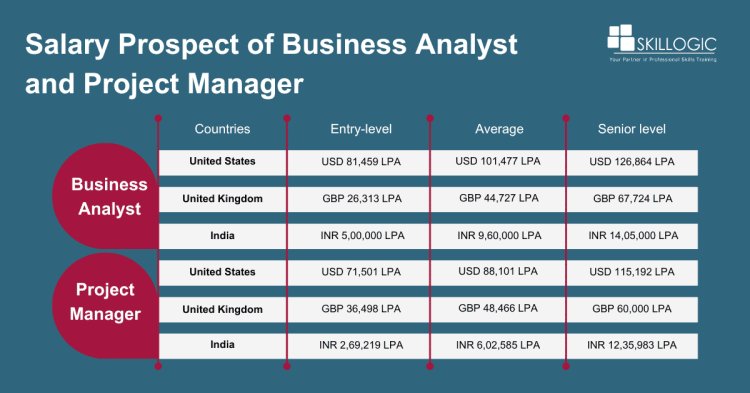Business Analyst Vs Project Manager
A Business Analyst focuses on understanding business needs and translating them into requirements, while a Project Manager oversees the execution of projects, ensuring they meet goals, timelines, and budgets. Both roles are crucial for successful project delivery but differ in scope and responsibilities.

In the dynamic landscape of project management and business analysis, the roles of Business Analyst (BA) and Project Manager (PM) often intertwine, leading to confusion regarding their responsibilities. While both are crucial for successful project execution, they serve distinct functions within the project ecosystem.
As per a report by Mordor Intelligence, the market size of Business Analytics was USD 81.46 billion in the preceding year and is anticipated to achieve USD 130.95 billion within the forthcoming five years, demonstrating a Compound Annual Growth Rate (CAGR) of 8.07% throughout the forecast period. Let's unravel the differences between a Business Analyst and a Project Manager through a step-by-step comparison.
Demystifying Business Analytics and the Role of Business Analysts
Business analytics is the practice of using data analysis and statistical methods to derive insights and inform decision-making within a business context. It involves collecting, processing, and analyzing data related to various aspects of a business, such as sales, marketing, operations, finance, and customer behavior, with the goal of identifying trends, patterns, and relationships that can be used to optimize processes, improve performance, and gain a competitive advantage.
In 2023, the worldwide business analytics market achieved a valuation of $225.3 billion, with projections indicating it will reach $665.7 billion by 2033. This upward trend suggests a Compound Annual Growth Rate (CAGR) of 11.6% from 2024 to 2033, as outlined in a report by Allied Market Research.
A business analyst is a professional who specializes in analyzing data and translating it into actionable insights to help organizations mak e informed decisions. They typically work closely with stakeholders from different departments to understand their needs and objectives, gather relevant data, perform analysis using statistical and analytical tools, and present findings and recommendations in a clear and understandable manner.
Understanding the Core Responsibilities
Business Analyst:
- Analyzes business processes, identifies areas for improvement, and proposes solutions to enhance efficiency and productivity.
- Gathers requirements from stakeholders through interviews, workshops, and documentation analysis.
- Translates business requirements into functional specifications and communicates them effectively to the development team.
- Serves as a liaison between technical teams and business stakeholders to guarantee that business requirements and technical solutions are aligned.
- Assists in the testing and validation of deliverables to ensure they meet the specified requirements.
Demystifying Project Management: The Essential Guide and Role of a Project Manager
Project Management is the disciplined approach of initiating, planning, executing, controlling, and closing projects efficiently to achieve specific goals and meet predefined success criteria. It involves the application of knowledge, skills, tools, and techniques to navigate through the complexities of project execution within constraints such as time, cost, scope, and quality.
According to a report from Verified Market Research, the Project Management Software market reached a value of $6.06 billion in 2022 and is projected to reach $13.46 billion by 2030. From 2023 to 2030, this growth is projected to occur at a Compound Annual Growth Rate (CAGR) of 10.5%.
A Project Manager is a dedicated professional responsible for leading project teams and ensuring successful project delivery from initiation to closure. They serve as the central point of contact, orchestrating the project's various aspects while balancing competing demands and constraints.
Responsibilities of a Project Manager:
- Plans, executes, and monitors projects from initiation to closure, ensuring they are completed within scope, schedule, and budget constraints.
- Develops project plans, schedules, and budgets, and allocates resources accordingly.
- Determines project risks and creates plans for mitigating them to reduce their influence on project goals.
- Facilitates communication among team members, stakeholders, and other project stakeholders to ensure everyone is informed and aligned.
- Monitors project progress, tracks key performance indicators, and adjusts plans as needed to keep the project on track.
Read these articles:
- Business Analyst Salaries in India
- The Essential Skills of a Business Analyst
- How to Become a Business Analyst: A Roadmap
Key Skills and Competencies of a Business Analyst and Project Manager
Business Analyst and Project Manager roles are both critical in ensuring the successful execution of projects within an organization. While they have distinct responsibilities, there are overlapping skills and competencies that are essential for both roles. Here's a breakdown of key skills and competencies for each:
Business Analyst:
- Analytical Skills: Ability to analyze data, processes, and systems to identify areas for improvement or optimization.
- Requirement Gathering: Proficiency in eliciting, documenting, and managing requirements from stakeholders to ensure project objectives are met.
- Problem-Solving: Capacity to identify problems, propose solutions, and make decisions that align with business goals and project scope.
- Communication Skills: Strong verbal and written communication skills to effectively convey complex information to stakeholders, developers, and project managers.
- Domain Knowledge: Understanding of the industry or domain in which the project operates, including relevant regulations, trends, and best practices.
- Technical Skills: Basic understanding of technical concepts and systems to communicate effectively with developers and other technical team members.
- Business Process Modeling: Proficiency in modeling current and future business processes using techniques such as BPMN (Business Process Model and Notation).
- Stakeholder Management: Ability to build and maintain relationships with stakeholders to ensure alignment of project goals and expectations.
- Critical Thinking: Capability to evaluate information objectively, assess risks, and make informed decisions.
- Documentation: Skill in creating clear and concise documentation, including requirements documents, user stories, and process flows.
Project Manager:
- Leadership: Ability to lead and motivate project teams, providing direction and guidance to achieve project objectives.
- Time Management: Proficiency in managing project schedules, milestones, and deadlines to ensure timely delivery.
- Risk Management: Capacity to identify, assess, and mitigate project risks to minimize potential impacts on project success.
- Budgeting and Resource Management: Skill in managing project budgets, allocating resources effectively, and optimizing resource utilization.
- Communication and Negotiation: Strong communication and negotiation skills to interact with stakeholders, resolve conflicts, and ensure project alignment.
- Scope Management: Ability to define and manage project scope, including scope creep and change control processes.
- Quality Management: Understanding of quality assurance principles and practices to ensure project deliverables meet quality standards.
- Adaptability: Flexibility to adapt to changing project requirements, priorities, and constraints.
- Project Planning and Execution: Proficiency in developing project plans, defining project objectives, and executing plans to achieve project goals.

Distinguishing Business Analysts from Project Managers
Here are the differences between business analysts and project managers outlined in points:
Business Analysts:
Focus on Understanding Business Needs: Business analysts primarily focus on understanding the business needs, requirements, and objectives of a project or initiative.
Requirements Gathering and Analysis: They are responsible for gathering, documenting, analyzing, and validating requirements from stakeholders.
Bridging Gap Between Business and IT: Business analysts act as intermediaries between business stakeholders and IT teams, ensuring that technical solutions align with business requirements.
Process Improvement: They often engage in process improvement initiatives, identifying areas where efficiency can be enhanced or where existing processes can be optimized.
Data Analysis: Business analysts frequently deal with data analysis, interpreting trends, patterns, and insights to inform business decisions.
Project Managers:
Focus on Project Execution: Project managers focus on the overall planning, execution, monitoring, and control of a project to ensure it meets its objectives within scope, time, and budget constraints.
Resource Management: They are responsible for managing resources, including personnel, finances, and materials, to ensure efficient project delivery.
Risk Management: Project managers identify, assess, and mitigate risks throughout the project lifecycle to minimize potential disruptions and ensure project success.
Communication and Stakeholder Management: They facilitate communication among project stakeholders, manage expectations, and ensure alignment between project deliverables and stakeholder needs.
Timeline and Milestone Tracking: Project managers create project timelines, set milestones, and track progress to ensure that the project stays on schedule and within budget.
Refer to these articles:
- Business Analytics Scope in India
- PMP vs PRINCE2: Which is Suitable For Me in India
- Why Six Sigma Certification in India?
Career Opportunities for Business Analyst and Project Manager
Career Opportunities for Business Analysts:
Business Analyst: The primary role involves analyzing business processes, identifying needs, and devising solutions to improve efficiency and productivity. Business analysts are in demand across various industries such as finance, healthcare, IT, and manufacturing.
Data Analyst: With a strong analytical background, business analysts can transition into data analysis roles. They interpret complex data sets, derive insights, and make recommendations to support decision-making processes within organizations.
Product Manager: Business analysts possess a deep understanding of market trends, customer needs, and business requirements, making them suitable candidates for product management roles. They oversee product development, strategize product roadmaps, and ensure alignment with business objectives.
Project Coordinator: Business analysts often possess strong organizational and communication skills, making them well-suited for project coordination roles. They facilitate project planning, track progress, and ensure timely delivery of project objectives.
Management Consultant: Leveraging their analytical abilities and business acumen, business analysts can pursue careers in management consulting. They advise organizations on strategic planning, process improvement, and operational efficiency to drive business growth.
Business Intelligence Analyst:Business analysts with expertise in data analysis and reporting can transition into business intelligence roles. They develop dashboards, conduct data visualization, and provide insights to support decision-making at all levels of the organization.
Systems Analyst: Business analysts with technical proficiency may explore roles as systems analysts. They evaluate IT systems, assess business requirements, and recommend solutions to enhance system functionality and meet organizational objectives.
Financial Analyst: Business analysts with a strong understanding of financial principles can pursue careers in financial analysis. They evaluate investment opportunities, analyze financial data, and provide insights to support strategic decision-making in finance. A business analytics course can enhance their ability to extract valuable insights from data, improving their analytical capabilities in financial contexts.
Career Opportunities for Project Managers:
Project Manager: Project managers lead teams to deliver projects on time, within budget, and according to specifications. They oversee project planning, resource allocation, risk management, and stakeholder communication across various industries.
Program Manager: Experienced project managers may transition into program management roles, where they oversee multiple related projects to achieve broader organizational objectives. They coordinate resources, manage interdependencies, and ensure alignment with strategic goals.
Portfolio Manager: Portfolio managers oversee a collection of projects or programs within an organization. They prioritize initiatives, allocate resources, and monitor performance to ensure optimal investment and alignment with business objectives.
Scrum Master: In agile environments, project managers may specialize as Scrum Masters. They facilitate agile ceremonies, coach teams on agile practices, and remove impediments to maximize productivity and delivery speed.
IT Project Manager: Project managers with expertise in information technology can pursue roles specifically focused on IT projects. They oversee software development, infrastructure upgrades, and technology implementations to support business objectives.
Construction Project Manager: Specializing in construction projects, project managers coordinate activities, manage budgets, and ensure compliance with safety regulations. They oversee construction timelines, subcontractor coordination, and quality control processes.
Healthcare Project Manager: In the healthcare sector, project managers lead initiatives to implement new healthcare systems, improve patient care processes, and ensure regulatory compliance. They collaborate with healthcare professionals, IT teams, and stakeholders to achieve project goals.

Salary prospect of Business Analyst and Project Manager
Here's a general breakdown of the salary prospects for Business Analysts and Project Managers at entry-level, average, and senior levels in the USA, UK, and India:
Business Analyst:
USA:
- Entry-level: According to a Glassdoor report, the salary of a entry level business analyst in USA ranges from USD 81,459 per year.
- Average: The salary of a Business analyst in USA ranges from USD 101,477 per year according to a Glassdoor report.
- Senior level: According to a Glassdoor report, the salary of a senior business analyst in USA ranges from USD 126,864 per year.
UK:
- Entry-level:The salary of a entry-level business analyst in UK ranges from GBP 26,313 according to an Indeed report
- Average: The average salary of a business analyst in UK ranges from GBP 44,727 per year according to an Indeed report
- Senior level: The senior business analyst salary in UK ranges from GBP 67,724 per year according to a Glassdoor report.
India:
- Entry-level: The salary of a entry-level business analyst salary in India ranges from ₹5,00,000 per year according a Glassdoor report.
- Average: According to the AmbitionBox report, the salary of a business analyst in India ranges from ₹9.6 LPA.
- Senior level: The salary of a senior buisness analyst in India ranges from ₹1405000 per year according to a Glassdoor report
Project Manager:
USA:
- Entry-level: According to a Glassdoor report, the entry-level salary of a project manager in USA ranges from $71,501 per year.
- Average: According to an Indeed reprot, the salary of a project manager in USA ranges from $88,101 per year
- Senior level: The salary of a senior project manager in USA ranges from $115,192 per year according to a Glassdoor report.
UK:
- Entry-level: The salary of a project manager in UK ranges from £36498 per year according to an Indeed report
- Average: The salary of a project manager in UK ranges from £48466 per year according to an Indeed report
- Senior level: The senior salary of a project manager in UK ranges from £60,000 per year according to a Talent.com report.
India:
- Entry-level: The salary of a entry-level project manager in India ranges from ₹269,219 per year according to an Indeed report.
- Average: The average salary of a project manager in India ranges from ₹6,02,585 LPA according to an Indeed report.
- Senior level: The senior salary of a project manager in India ranges from ₹12,35,983 per year according to a Talent.com report
Read the following articles:
- Business Analytics Scope in Bangalore
- Business Analytics Scope in Pune
- Business Analytics Scope in Hyderabad
While both roles of Business Analyst (BA) and Project Manager (PM) are essential for successful project execution, they serve distinct yet complementary functions within an organization. BAs primarily focus on understanding business needs, analyzing requirements, and translating them into actionable plans for implementation. On the other hand, PMs are responsible for overseeing the entire project lifecycle, managing resources, timelines, and risks to ensure timely and within-budget delivery. While BAs delve deep into the specifics of business processes and requirements, PMs have a broader scope, orchestrating the project's execution from initiation to closure. Collaboratively, they form a cohesive team ensuring projects align with business objectives while effectively managing resources and stakeholders.
SKILLOGIC Institute offers aspiring learners a premier opportunity to enhance their skills through specialized certification courses in Project Management, Quality Management, Cybersecurity, and Software Development. With a distinguished track record spanning over a decade, SKILLOGIC® has established itself as a global leader in the field, serving a diverse international student body of over 100+ Learners. Boasting a comprehensive selection of over 25 accreditations and partnerships, coupled with a dedicated faculty of more than 100 seasoned instructors, SKILLOGIC Institute provides unparalleled prospects for professional advancement and personal growth.
SKILLOGIC offers expert-led certification programs in Six Sigma, PMP, Cybersecurity, and Business Analytics. Known for its high-quality training, SKILLOGIC provides valuable industry insights. With over ten years of excellence, its Business Analyst course is available offline in Bangalore, Chennai, Pune, and Hyderabad, making it easily accessible to learners across India.

0
574